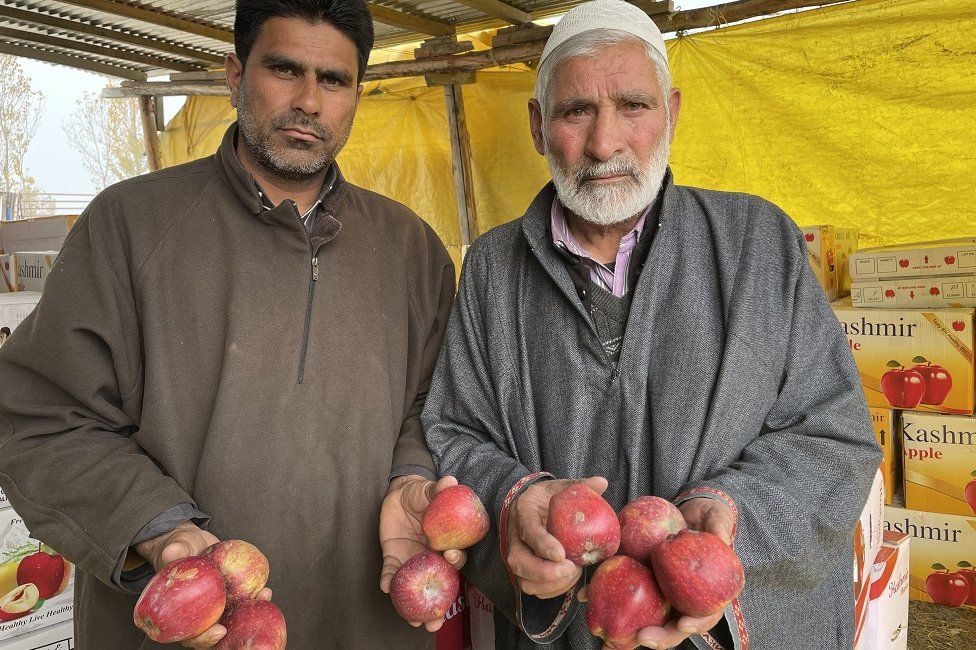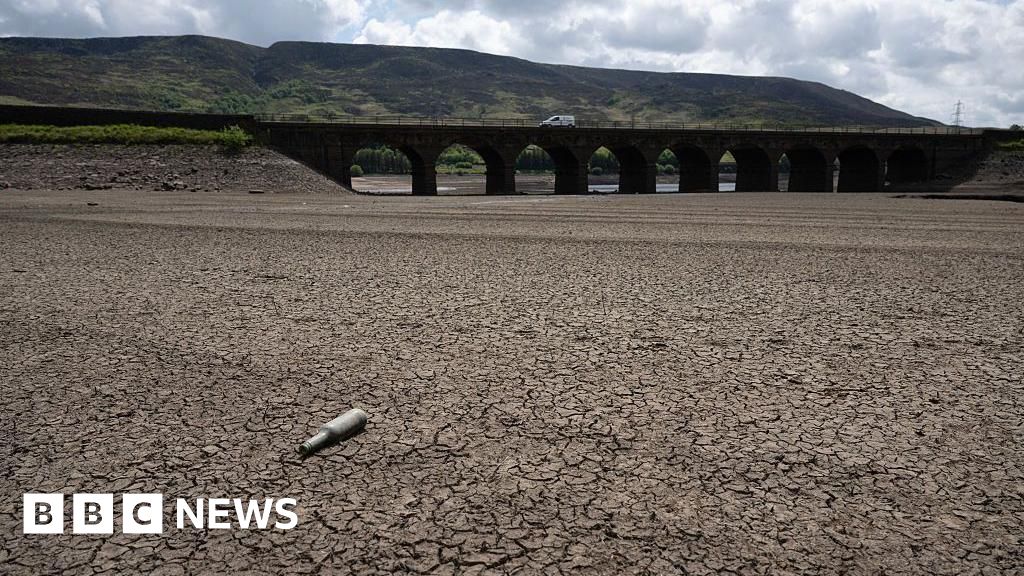ARTICLE AD BOX
 Image source, Umer Asif
Image source, Umer Asif
A series of challenges has thrown Kashmir's once flourishing apple trade into crisis
By Auqib Javeed
Srinagar, Kashmir
On a chilly and foggy winter day, hundreds of apple farmers in Pulwama district of Indian-administered Kashmir stored their harvest in a temporary tin shelter installed at the fruit market, anticipating the arrival of traders who would purchase their produce.
The farmers were anxious as the quality of apples this year had not been the best and would affect the price they'd get.
Kashmir is known in India for its variety of apples. But a series of challenges - from the onslaught of fungal scab, the impact of climate change, and a range of economic hurdles - has thrown the flourishing industry into a state of crisis.
Apples are classified into A, B and C categories based on their size, colour and quality. A is the premium category while B and C are those infected with scab (venturia inaequalis) - B being less infected than C.
"Around 40% of the apple production [this year] has been C-grade," says Ghulam Nabi Mir, an orchardist from Pulwama.
The horticulture department of Jammu and Kashmir says apple, walnut and almond farming provide direct and indirect employment to about 2.3 million people in the region.
Exports from the Himalayan region's orchards amount to over two million tonnes annually, generating approximately 120bn rupees ($1.44 bn, £1.14bn) in revenue - which is almost twice as much as the region's tourism sector, Ejaz Ayoub, an independent Srinagar-based economist, told the BBC.
But unusual weather patterns are beginning to take a toll.
"Unseasonal rainfall in April-May led to scab affecting the crop," says Abdula Gaffar Qazi, 50. "Even when some farmers sprayed pesticides, the rain washed it away."
Extreme weather patterns impact the size, quality and quantity of the crop, says Dr Tariq Rasool Rather, a senior scientist at Sher-e-Kashmir University of Agricultural Sciences.
Image source, Umer Asif
Image caption,Apple trade generates almost twice as much revenue as the region's tourism sector, experts say
Depending on whether scab affects the crop during the summer or spring season, apple quality can decline to a B or C grade.
Ghulam Mohammad Bhat, 58, a farmer from the Chadoora area of Kashmir's Budgam district, says he has never witnessed such unusual weather patterns in the region before.
"Hailstorm in May damaged my crop," he says, adding that a prolonged dry spell in August and September caused water scarcity, leading to diminished colour in the apples.
Mr Bhat's apple orchard is spread over five acres but more than half of the trees are infected with scab.
Data from Jammu and Kashmir's meteorology department shows the frequency of severe weather occurrences in the ecologically sensitive Kashmir Valley has increased over the past seven years.
Over 550 people have been killed in extreme weather events in Jammu and Kashmir between 2010 and 2022, it says.
On 18 July 2021, Kashmir witnessed the hottest July in eight years with a record temperature of 35C (95F). Earlier that year in January, the valley had also recorded the coldest night in 30 years.
According to Faizan Arif Keng, an independent weather forecaster in Kashmir, the region witnessed dry weather with temperatures approximately 12C above normal from March to mid-April this year, resulting in early flowering of apple crops. But the weather then changed abruptly and temperatures remained below normal until June.
"This 'false spring' damaged the crop," he says.
Extreme weather makes crop transportation also a major challenge for farmers.
Harvest starts in autumn season. But the valley remains cut off from the rest of the world in winters because of the landslides on the treacherous Srinagar-Jammu national highway, the only road that connects the region to the other states of the country.
It's common to see hundreds of trucks carrying apples stranded for days if landslides block the highway.
Vijay Taira, vice-president of the Kashmir Apple Merchants Association in the Azadpur fruit market in Delhi, says there's been an influx of Iranian apples in India's fruit markets.
This, growers say, affects the Kashmiri apple's market share and its price
"Only two weeks ago, a box of Kashmiri apples would sell at 1,000-1,300 rupees in India's fruit markets," says Ahmad Bashir, president of the Kashmir Valley Fruit Growers Cum Dealer Union (KVFG). "Now, it is being sold at 800 rupees a box, which does not even cover the cost of production."
The Indian government's decision to waive off a 20% tariff on apples imported from the United States has also left farmers in distress over drop in prices, he says.
Image source, Umer Asif
Image caption,Extreme weather patterns impact the size, quality and quantity of the crop, a senior scientist says
In November, KVFG wrote to Prime Minister Narendra Modi, seeking his intervention in resolving the crisis.
The region's horticulture department says these issues can only be resolved at the federal level.
"We have raised these concerns with the government," says Manzoor Ahmad Mir, deputy director of the department. "Only they can take a call [on it]."
Kashmiri apple farmers also worry the government is not cracking down on dealers selling spurious or sub-standard pesticides.
"If the pesticides were of reliable quality, the scab in our orchards would be less," Mr Bhat says.
Shafiqa Khalid, also a deputy director at the region's horticulture department, says strong action has been taken against accused dealers and criminal cases have been filed against them.
Problems arise when farmers don't heed advisories regarding pesticide spray schedule, she says.
When apple farmers don't make good income, the "consumption which drives the domestic economy" is directly impacted, Mr Ayoub, the economist, explains.
"The money flows in the market and reaches many people associated with different kinds of trade," he says. "So, if the money stops, people from all walks of life will be impacted."
BBC News India is now on YouTube. Click here to subscribe and watch our documentaries, explainers and features.

 1 year ago
56
1 year ago
56








 English (US) ·
English (US) ·